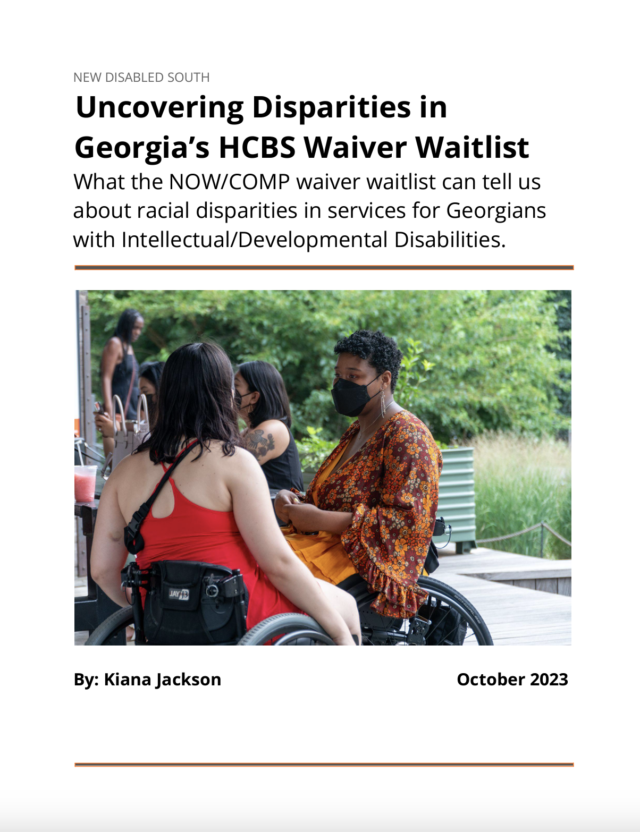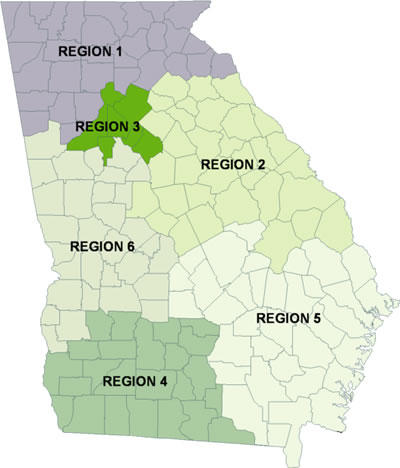Families of adults with developmental disabilities (DD) often find themselves as primary caregivers because they do not want the relative to be institutionalized and alternative options are not always readily available.
Individuals with DD who have been referred to a nursing home or other institutional level of care, may be eligible for home and community-based services (HCBS) through Georgia’s Medicaid program that would allow them to live at home. According to literature provided by the Georgia Department of Community Health (DCH), “Home and Community Services A Guide to Medicaid Waiver Programs in Georgia,” many of these services are called waiver programs, because the Centers for Medicare & Medicaid Services (CMS) allows states to “waive” certain Medicaid requirements and pay for HCBS as an alternative to living in a nursing home or other type of healthcare facility or institution.
The pamphlet goes on to explain that “although different waiver programs offer different services, they have some things in common. Each program is designed to help people who qualify for institutional care to remain in the community or return to the community from nursing homes, hospitals or other long-term institutions.”
But qualifying for these benefits doesn’t always ensure that the person with the disability will receive them in a timely manner. Sometimes people may meet the criteria to receive Medicaid services under a waiver program but will be placed on a waiting list to actually receive a waiver. Funding for Georgia’s New Option Waiver Program (NOW) and Comprehensive Supports Waiver Program (COMP) is limited and only a certain number of people can receive services based on available funds. This means there are nearly always people on the waiting lists for the HCBS waivers.
The state’s literature goes on to state that “a person may be selected from the waiting list to receive services based on the severity of need, the availability of informal/family support, the length of time on the waiting list, and a person’s continued eligibility for the level of care provided in a nursing home or ICF-ID/DD [intermediate care facility for individuals with intellectual or other developmental disabilities].”
Data Points to Racial Disparities
 A report released in October of 2023 by New Disabled South, a nonprofit that says it is “building a coalition of disability justice activists, advocates and organizations in the South,” used data provided by the state of Georgia to indicate that there is racial bias in approving funds to individuals on the waitlist. In New Disabled South’s report, “Uncovering Disparities in Georgia’s HCBS Waiver Waitlist,” the introduction to the executive summary points out that “troubling disparities have emerged in the distribution and utilization of [HCBS] waivers, with stark disparities in access and availability based on race.“
A report released in October of 2023 by New Disabled South, a nonprofit that says it is “building a coalition of disability justice activists, advocates and organizations in the South,” used data provided by the state of Georgia to indicate that there is racial bias in approving funds to individuals on the waitlist. In New Disabled South’s report, “Uncovering Disparities in Georgia’s HCBS Waiver Waitlist,” the introduction to the executive summary points out that “troubling disparities have emerged in the distribution and utilization of [HCBS] waivers, with stark disparities in access and availability based on race.“
According to New Disabled South’s research, “75% of people on these waiting lists in this country reside in the South, and coupled with a nationwide shortage of care workers due to poverty wages, there is a critical care crisis facing the disability community, particularly those with I/DD [intellectual or other developmental disabilities].”
Currently, there are more than 7,100 people in the state of Georgia on the waiting list for NOW and COMP HCBS waivers. As New Disabled South advocated around this issue with state legislators in 2023, the organization learned through anecdotes and personal stories that many people impacted by this waiting list had been on it for as long as 10 to 20 years. Many of those accounts were from people of color.
According to a letter sent by New Disabled South’s CEO Dom Kelley to advocates and stakeholders, the report contains two critical highlights:
- There are 27.9% more Black Georgians waiting for NOW or COMP waivers compared to white people with DD.
- For those receiving waiver services, white individuals account for a significantly higher percentage than Black recipients.
“We are beginning to expand this analysis to the rest of the region to better understand these disparities across the South,” wrote Kelley.
The report states that it aims to achieve the following:
- Initiate informed discussions and advocate for a more just and inclusive approach to providing vital supports to all Georgians, regardless of their racial background.
- Examine the breakdown of racial groups of both the New Options Waiver and Comprehensive Supports Waiver Program waitlist and the list of receivers.
- Focus on racial categories that exceed 5% of Georgia’s population and more than 10% of the state’s waiver receiver or waitlist population.
When asked for a reaction to the report, the Georgia Department of Behavioral Health & Developmental Disabilities (DBHDD) shared:
“The blog post [report] draws an unfortunate and inaccurate conclusion. DBHDD has reached out to the sponsoring organization to offer a better understanding of the state’s NOW/COMP waiver program which supports more than 13,000 Georgians,” wrote Ron Wakefield, director of the Division of Intellectual and Developmental Disabilities of DBHDD in response to requested written questions.
“DBHDD assigns waivers through a nationally-recognized, widely-utilized and standardized process. All applicants are initially placed on the planning list and are assigned a waiver slot based on need. Even if an applicant does not immediately receive a waiver slot, there are often state-funded resources to meet needs in the short term.”
He concluded his correspondence with this statement: “DBHDD’s 4,500 dedicated employees and community service providers work tirelessly to help those with behavioral health issues or developmental disabilities. Georgians with such needs should reach out to DBHDD and can rest assured we will do all we can to ensure they receive any and all assistance for which they qualify.”
Individuals seeking services from DBHDD, whether waivers or state funds, can begin the process of an online application by going to www.georgiacollaborative.com and clicking the link to apply for ID/D services. Those who are not able to access the online application should reach out to their DBHDD regional office to start the process of applying for services. To find out where and how to contact your regional office, check out the map here with the contact information.
Georgia isn’t Alone
Justice in Aging, a nonprofit that has been “using the power of law to fight for the rights of low-income older adults since 1972,” released an issue brief in June of 2023 called “An Equity Framework for Evaluating and Improving Medicaid Home and Community Based Services.” Although its advocacy is primarily for adults over the age of 65, the brief pointed out that “systemic drivers of health inequities — racism, ageism, ableism, classism, sexism, xenophobia, and homophobia — are embedded in laws, policy, governance, and culture that shape HCBS programs.”
The brief pointed out the U.S. Supreme Court decision in 1999 in Olmstead V. L.C. which held that the unnecessary institutionalization of individuals living with disabilities violates their rights under the Americans with Disabilities Act to receive services in the least restrictive setting. Since then, federal and state policies, guidance, and resources have significantly shifted to better rebalance the provision of long-term care away from institutional settings toward home and community-integrated settings.
However, states are not required to cover HCBS and the “system” is a patchwork of HCBS programs with wide variation among and within states, leading to inequities in who has access to the supports and services needed.
Additionally, the Kaiser Family Foundation released an assessment of waiting lists for HCBS services across the country.
Key takeaways include:
- The number of states that maintain waiting lists or interest lists for people who would like to receive HCBS has fluctuated little between 2016 and 2023.
- In most years since 2016, there have been close to 0.7 million people on waiting lists or interest lists, with a total of over 692,000 in 2023.
- Most people on waiting lists or interest lists have intellectual or developmental disabilities and most live in states that do not screen any people for eligibility prior to adding them to waiting lists.
- Most people on waiting lists or interest lists are eligible for personal care provided through states’ regular Medicaid programs or for services provided through specialized state plan HCBS benefits.
It’s important to note that these assessments do not include a racial breakdown of the distribution of services and supports. As far as the Georgia Council on Developmental Disabilities (GCDD) is aware due to its research for other sources and reports, New Disabled South is the only report to identify this disparity.
Justice in Aging developed an HCBS Equity Framework for the California Long-Term Care Equity Series supported by the California Health Care Foundation to support policy makers, payers, providers, advocates and consumers in making equity a primary focus at every stage of HCBS program design and implementation.
It provides examples of policies, program rules, and decision points in which an equity evaluation should be considered. This Framework was set up to provide a starting point for thinking about and evaluating the ways in which equity can be embedded in HCBS programs to ensure all eligible individuals have access to adequate and quality services.
State Researchers Concurs with Report
When asked about her reaction to the New Disabled South report, Dr. Erin Vinoski Thomas, research associate professor with the Department of Health Policy & Behavioral Sciences and interim co-director for the Center for Leadership in Disability School of Public Health at Georgia State University, didn’t seem surprised at the conclusions.
“My first reaction to the findings was that they confirm what those of us working to support Georgia’s disability community have long known — individuals with disabilities who are members of racial and ethnic minority groups tend to face even more significant barriers to accessing needed services than those who are white,” she wrote in answer to the same written questions asked of DBHDD.
Kiara Jackson of New Disabled South said her research shows this to be true. “What we see in the data is a part of a larger issue within public health. … Black people particularly face disparate outcomes across the public health sector. It shows up in every facet of public health, when it comes to mortality rates, when it comes to life expectancy, life quality, access to health care, access to resources, etc.”
Kelley of New Disabled South agrees with both researchers.
“There are many hoops to jump through in order to receive the kind of care that somebody … who has I/DD needs,” he said. “From my vantage point, we have a racial disparity between who gets what kind of waiver and … that’s a process in and of itself.”
He refers to processes that involve a therapist that works for the Department of Behavioral Health and Developmental Disabilities who reviews an application, deciding what level of needs the individual requires, and deciding all of these things.
“It’s quite a lengthy process,” Kelley adds. He added that having the resources to get to the assessment and then getting on the waiting list is not simple. The report doesn’t take that into consideration, he said, but it’s a contributing factor.
“’We weren’t doing an audit of the application process or any of that, which is something that I would love for us to explore because I have lots of thoughts about learning more about the application process,” he said.
Dr. Vinoski Thomas added that there needs to be an understanding of the process in order to improve it.
“As a researcher, I think that we need to more thoroughly understand DCH [Georgia Department of Community Health] and DBHDD’s existing processes for allocating waivers before we can understand how to improve the process. For some waiver types, DBHDD and DCH make allocations based on a ‘most in need’ determination. Is, or how is, equity considered in determination of need? That is one place I would start.”
Sources:
- Georgia Department of Community Health: Home and Community Services: A Guide to Medicaid Waiver Programs in Georgia (PDF)
- Justice in Aging: An Equity Framework for Evaluating and Improving Medicaid Home and Community Based Services (PDF)
- Kaiser Family Foundation: A Look at Waiting Lists for Medicaid Home- and Community-Based Services from 2016 to 2023 (PDF)
Resources:
Online Waivers Application: https://www.georgiacollaborative.com/
 Regional Map of DBHDD offices: https://dbhdd.georgia.gov/regional-field-offices
Regional Map of DBHDD offices: https://dbhdd.georgia.gov/regional-field-offices
Contact your regional field office:
Region 1 Field Office serves the following 31 counties in North Georgia:
Banks, Bartow, Catoosa, Chattooga, Cherokee, Cobb, Dade, Dawson, Douglas, Fanin, Floyd, Forsyth, Franklin, Gilmer, Gordon, Habersham, Hall, Haralson,Hart, Lumpkin, Murray, Paulding, Pickens, Polk, Rabun, Stephens, Towns, Union, Walker, White, and Whitfield.
Primary: (678) 947-2818
Toll Free: (877) 217-4462
Visit: (details)
1230 Bald Ridge Marina Road
Suite 800
Cumming, GA 30041
Information: https://dbhdd.georgia.gov/regional-field-offices/region-1-field-office
Region 2 Field Office serves the following 33 counties in East Central Georgia:
Baldwin, Barrow, Bibb, Burke, Clarke, Columbia, Elbert, Emanuel, Glascock, Greene, Hancock, Jackson, Jasper, Jefferson, Jenkins, Jones, Lincoln, Madison, McDuffie, Monroe, Morgan, Oconee, Oglethorpe, Putnam, Richmond, Screven, Taliaferro, Twiggs, Walton, Warren, Washington, Wilkes, and Wilkinson.
Primary: (706) 792-7733
Fax: (706) 792-7740
Toll Free: (866) 380-4835
Visit: (details)
3405 Mike Padgett Highway
Building 3
Augusta, GA 30906
Information: https://dbhdd.georgia.gov/region-2-field-office
Region 3 Field Office serves the following 6 counties surrounding Metro Atlanta: Clayton, Dekalb, Fulton, Gwinnett, Newton and Rockdale. The Region 3 Field Office is located on the campus of Georgia Regional Hospital – Atlanta.
Primary: (404) 244-5050
Primary: (404) 244-5056
Fax: (404) 244-5179
Visit: (details)
3073 Panthersville Rd.
Building 10
Decatur, GA 30034
Information: https://dbhdd.georgia.gov/region-3-field-office
Region 4 Field Office serves the following 24 counties in Southwestern Georgia: Baker, Ben Hill, Berrien, Brooks, Calhoun, Colquitt, Cook, Decatur, Dougherty, Early, Echols, Grady, Irwin, Lanier, Lee, Lowndes, Miller, Mitchell, Seminole, Terrell, Thomas, Tift, Turner, and Worth.
Primary: (229) 225-5099
Toll Free: (877) 683-8557
Fax: (229) 227-2918
Visit: (details)
400 S. Pinetree Boulevard
Thomasville, GA 31792
Mail to:
PO Box 1378
Thomasville, GA 31799-1378
Information: https://dbhdd.georgia.gov/region-4-field-office
Region 5 Field Office serves the following 34 counties in Southeastern Georgia: Appling, Atkinson, Bacon, Bleckley, Brantley, Bryan, Bulloch, Camden, Candler, Charlton, Chatham, Clinch, Coffee, Dodge, Effingham, Evans, Glynn, Jeff Davis, Johnson, Laurens, Liberty, Long, McIntosh, Montgomery, Pierce, Pulaski, Tattnall, Telfair, Toombs, Treutlen, Ware, Wayne, Wheeler and Wilcox.
Primary: (912) 303-1670
Fax: (912) 303-1681
Visit: (details)
1915 Eisenhower Drive
Building 7
Savannah, GA 31406
Information: https://dbhdd.georgia.gov/region-5-field-office
Region 6 Field Office serves the following 31 counties in West Central Georgia: Butts, Carroll, Chattahoochee, Clay, Coweta, Crawford, Crisp, Dooly, Fayette, Harris, Heard, Henry, Houston, Lamar, Macon, Marion, Meriwether, Muscogee, Peach, Pike, Quitman, Randolph, Schley, Spalding, Stewart, Sumter, Talbot, Taylor, Troup, Upson and Webster.
Primary: (706) 565-7835
Visit: (details)
3000 Schatulga Road
Building 4
Columbus, GA 31907-2435
Information: https://dbhdd.georgia.gov/region-6-field-office
